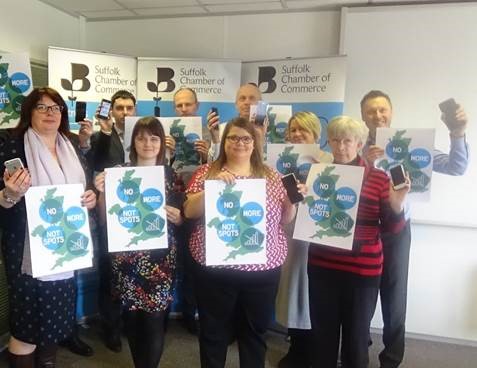Today (Tuesday) the British Chambers of Commerce (BCC) launches its campaign for ‘No More Not-Spots’, with the aim of ending not-spots for voice coverage where UK phone users live, work, travel and play. Suffolk Chamber of Commerce is fully in support of this much-needed campaign.
The UK’s leading business group is launching a campaign that will bring together business communities and those involved in delivering coverage to identify coverage challenges and work through solutions to improve poor mobile coverage.

Not-spots, and areas of partial not-spots hamper UK businesses. A recent survey by the BCC of over 1,400 companies, found that a fifth (21%) of firms say the UK mobile phone network doesn’t meet their needs in accessing new and existing customers, suppliers and employees.
John Dugmore, Suffolk Chamber’s chief executive said “the aim of the campaign is straightforward: by 2020 UK phone users will no longer experience not-spots for voice coverage in locations used for home, work, travel or play.
“Suffolk Chamber’s No More Not-Spots campaign will raise awareness of the issue among businesses and residents alike and will encourage them to report not-spots to their respective operators. It is vital that people submit their own experience of not-spots in order make the best case possible for improved coverage in each affected area.
“You can also raise issues via Twitter, using hashtag #shareyournotspots. Please don’t rely on others to do it!”
Dr Adam Marshall, director general of the BCC, added “a reliable mobile phone signal is one of the most basic requirements for any business, as more and more conversations and transactions take place while people are on the go. Unfortunately, dropped calls and poor signal remains an issue in many areas across the UK.
“From today, we’ll be campaigning for an end to mobile phone ‘not spots’ all across the UK, so that business people can connect to customers, suppliers and staff – and so that local communities can better connect, too.”

